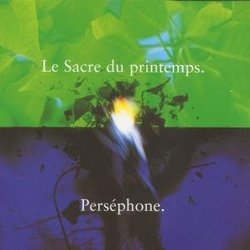| All Artists: Stravinsky, Nagano, Lpo Title: Rite of Spring / Persephone Members Wishing: 0 Total Copies: 0 Label: Virgin Records Us Release Date: 5/21/1996 Genre: Classical Styles: Ballets & Dances, Ballets, Historical Periods, Modern, 20th, & 21st Century Number of Discs: 2 SwapaCD Credits: 2 UPC: 724356124929 |
Search - Stravinsky, Nagano, Lpo :: Rite of Spring / Persephone
 | Stravinsky, Nagano, Lpo Rite of Spring / Persephone Genre: Classical
|
Larger Image |
CD Details |
CD ReviewsA rare chance to hear the beautiful, neglected "Persephone" Santa Fe Listener | Santa Fe, NM USA | 05/30/2009 (4 out of 5 stars) "Kent Nagano has had a career trajectory that is as much sideways as upward. He made his name in France and is now installed as Dutoit's successor in Montreal. for a period in the Nineties there were some major recordings, but they faded and are only now trickling back. Here we have a two-disc set that combines completely inessential Stravinsky (yet another Rite of spring) with a forgotten major work, Persephone. It's the latter that attracted me.
Persephone was written in 1934 at the height of Stravinsky's neoclassical period. It is a unique work. Like Oedipus Rex, it's an oratorio based on classical themes, in this case the rape of Persephone, daughter of the goddess Demeter, who becomes Pluto's queen in the underworld, only to be reborn each spring as the spirit of growth and renewal. Perhaps as an oratorio the work might have succeeded, despite rather frigid text by Andre Gide (he and Stravinsky didn't get along). But the element of dance was added. Persephone must speak and dance her part. Ida Rubinstein accomplished that in 1934, and I imagine the ballerina Vera Zorina, one of Balanchine's wives, did the same. She's the excellent narrator in Stravinsky's inspired reading on Sony from 1966. However, calling on such a unique talent, as well as other dancers, a tenor saddled with a difficult role, more dancers, a chorus, and full orchestra has more or less doomed Persephone. Even in the best concert performances, there are long blank stretches that need to be visually filled in by stage action, as the composer intended. Since the Sony recording isn't available except in Stravinsky's complete works, the listener must choose between three alternatives: Michael Tilson Thomas on RCA, Robert Craft on MusicMasters, and this Nagano release. Only the Craft comes on a single CD, but it's out of print. The other two saddle you with another Le sacre (Nagano's is bright and well recorded but not inspired), and MTT adds a needless Firebird, also. Let me say that no one finds the propulsion and dramatic tension that the composer did. Nagano comes closest, given that the Craft feels flat and the Tilson Thomas is overly refined, to the point of prissiness. The problem lies with a preconception about neoclassicism, that it should be dry, polite, and even mechanical in expression. Nagao is on the polite side but otherwise he has an excellent French narrator in Anne Fournet, a fine chorus with acceptable ?French, and the notable Anthony Rolfe-Johnson, one of the most stylish English tenors. The reading is stylish overall, and Virgin's recording is easier to listen to than Stravinsky's, which needs remastering to remove some early-digital glare. The work is divided into three natural parts: the abduction of Persephone, her time in Hades, and her rebirth. There's more variety in the score than in, say, Apollo or Orpheus, where Stravinsky's classical restraint extended to pristine emotion. Here we have touches of terror and excitement, but the fact that Demeter and Pluto are silent -- their part is for dancers only -- means that a recording of Persephone is strictly an oratorio for chorus, female speaker, and tenor. There's a sameness of color that wouldn't matter if the work were staged. Even so, this is a glorious, woefully neglected score. I stayed away for years and can only hope that my newfound enthusiasm will lure a few more of the curious." |

 Track Listings (14) - Disc #1
Track Listings (14) - Disc #1